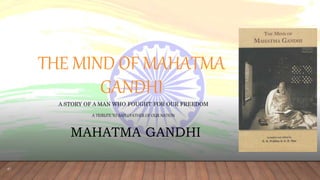The mind of mahatma gandhi
- 1. THE MIND OF MAHATMA GANDHI A STORY OF A MAN WHO FOUGHT FOR OUR FREEDOM A TRIBUTE TO BAPU/FATHER OF OUR NATION MAHATMA GANDHI
- 2. ABOUT THE BOOK : • The Mind of Mahatma Gandhi presents to the reader the quintessence of Gandhiji's thought and philosophy.• The proofs of the original edition were submitted to Gandhiji in 1944, and were read by him. A committee which he had appointed to scrutinize the compilation expressed the opinion that it would constitute "a new Gita, a new Bible". The book came out, with Gandhiji's approval, in March 1945. A second edition became necessary in October 1946.
- 3. SUMMARY : • To judge a great man or to decide his place in history, during his life- time, is not easy. Gandhiji had once observed: "Solon found it difficult to pronounce on a man's happiness during his life; how much more difficult it must be to adjudge on a man's greatness?" On another occasion, speaking of himself, he had said: "It will be time enough to pronounce a verdict upon my work after my eyes are closed, and this tabernacle is consigned to the flames." Nineteen years have now passed since he died-a martyr. • His death was mourned by the entire world, surely as no other death in human history. Grief at his passing away was enhanced by the manner of it. As one observer put it, his assassination would be remembered for centuries to come. The Hearst Press of the United States believed that its emotional impact upon the world at the time had no parallel in human annals since the similar martyrdom of Lincoln. It could aptly be said also of Gandhiji that "he now belongs to the Ages". One recalls Jawaharlal Nehru's memorable words on that somber night: "Alight has gone out of our lives", d sentiment which the New York Times, on January 31, 1948, underscored, adding that it remained for the inexorable hand of history to write down the rest.
- 4. “BE THE CHANGE YOU WANT TO SEE IN THE WORLD” -MAHATMA GANDHI MADE BY -NAYAN ZANWAR



